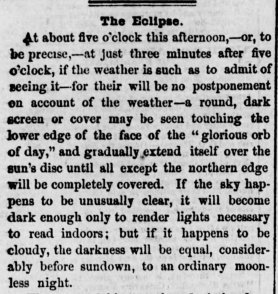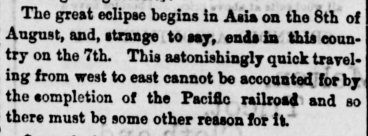Today, August 21, 2017, a total solar eclipse will roll across North America. For many, this will be a once-in-a-lifetime experience. In Illinois, some people remember the partial eclipse experienced here in 1970 and 1979, but the last time Illinois residents experienced a full total solar eclipse was in 1869. This eclipse was the only time in the history of the state (established in 1818) that a total eclipse had ever been observed! As this Daily Herald article discusses, Illinoisans were building the State Capital building at the time, and attempted to commemorate the occasion with a monument at the capital. Since solar eclipses are such relatively rare occurrences, I wondered, which of my ancestors experienced a solar eclipse during their lifetimes?

It turns out, some of my ancestors would have been able to see a complete solar eclipse from their homes, and even a few more who would have seen a partial solar eclipse sometime in their lives. Unfortunately, none of my ancestors recorded their solar eclipse experiences, but I can imagine what they would have seen and done.
7 March 1970:
My mother remembers this partial eclipse from her home in Northern Illinois. In her area, the sun was about 70% covered by the moon. She remembers standing on her back porch, watching the eclipse with her homemade cardboard box eclipse viewer. Local newspaper reports indicate that clouds and rain were threatening to block out the view, but apparently my mom attempted to see it anyway!

24 January 1925:
A 95% total eclipse would have been observed in DeKalb County, Illinois, but it was apparently overcast that morning, and the eclipse was not entirely visible. Six of my great-grandparents lived with their families in DeKalb County or Chicago, and would have missed out on this eclipse because of weather. Perhaps they paused their daily lives to try to peek out at the partial eclipse through the clouds.

My paternal great-grandparents would have had a much better view of this eclipse. George and Pauline Weil lived in Kingston, New York at the time and would have been able to view the total eclipse. George worked as a teacher at Emmanuel Lutheran School. He and Pauline had four young boys at home. George may have used the solar eclipse as a teaching opportunity and taken his oldest boys, ages 7 and 5, outside in the frigid cold to view the eclipse. According to the evening issue of The Kingston Daily Freeman from that day, the weather was brutally cold but the sky was wonderfully clear to watch the eclipse. Daily business came to a standstill during the moments when the moon was completely covering the sun. (Read the full fascinating account here on Newspapers.com.) I imagine that George and his family would have also viewed this moment with wonder.




8 June 1918:
During this eclipse, the moon covered about 70% of the sun in Northern Illinois. Unlike the 1925 eclipse, the weather that day was clear, and the eclipse was clearly visible. My Illinois ancestors who didn’t get to see the eclipse in 1925 likely caught a glimpse of this partial solar eclipse. My great-grandparents, Charles and Emma Drake, may have simply been working on the farm that morning as usual and paused to look up at the sky. Emma would have been 8 months pregnant with her first son. In some cultures, it is unlucky for pregnant women to view the solar eclipse, so I wonder if she was slightly superstitious and stayed inside, or if she was curious and glanced at it. My other great-grandparents, Glenn and Mildred (Lawrence) Kaiser, and Erwin and Dorothy (Mueller) Wischmeyer were not yet married, and were living with their families in DeKalb and Chicago, respectively. Glenn Kaiser would have missed the eclipse entirely because he was serving in the military in France. Perhaps he heard about the eclipse from family members who wrote to him while he was away.
7 August 1869:
My great-great grandmother Jennie Holbrook was nine years old and lived with four siblings and her parents on a farm near a small town named Manlius, Bureau County, Illinois. They were just a tad too far north to see a complete eclipse, but at over 90% coverage of the sun, the sky would have still been noticeably dark. On this particular Saturday, I’d imagine that they also paused their daily routine to admire the nearly full eclipse. They may have read about the eclipse in the Ottawa Free Trader or another local newspaper. This eclipse was the first eclipse in the United States to have a clear photograph taken of it. The center of the eclipse passed right through Springfield, IL as they were building the Capital. This was the last time that Illinoisans experienced a total eclipse.


Later today, I will try to take advantage of this once-in-a-lifetime opportunity to view a total solar eclipse from my home. I wonder, will the weather cooperate? Will it be cloudy, like the eclipses my relatives experienced in 1925 and 1970? Or will I get lucky, like George and Pauline Weil, and be able to view the total eclipse under clear skies? And will it be memorable, so that I can someday tell my children about it? Time will soon tell!
Did any of your relatives experience any cool eclipses in the past?
EvaAnne,
This is such an interesting post! We all think about big history events (i.e., wars, etc.) affecting our families, or even the usual details of life (birth, death, marriage, etc.). But, I don’t think it crosses our minds when we experience something unusual, like the solar eclipses, that our ancestors might have had similar experiences.
I love how you chose to present this information, also. Mixing the newspaper reports along with the speculations of your particular families’ actions piqued my curiosity. Now, I will have to check out my family’s whereabouts and actions during solar eclipses.
I have many relatives in the Kendall county area, then and now. I will have to start checking on that!!
Thanks again for a great post!
Diane
LikeLike
Thank you for your comments! When the midwest experienced the Eclipse Fever last summer, it really got me wondering if my grandparents and other relatives had every witnessed one. I was shocked to find out that my Kingston, NY relatives definitely would have had the opportunity to see it! I wish I knew more about their actual personal experiences back then!
LikeLike